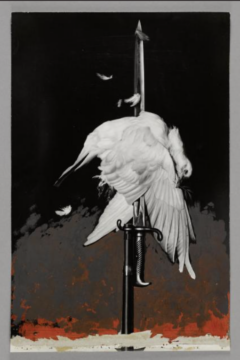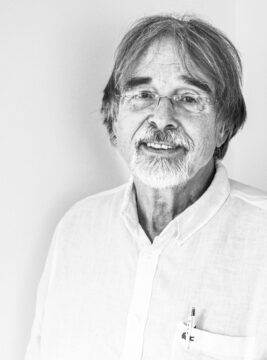by Gunnar Heinsohn (translated by Rafaël Newman)

The past weekend marked the second anniversary of the full-scale Russian invasion of Ukraine on February 24, 2022. The following article originally appeared in German in Die Welt magazine on April 29, 2022. It is posted here in a first-time English translation, with the permission of its author and in his memory, during a period in which the meaning of genocide is being discussed with new urgency.
Following his initial genocide—committed from 1999 to 2009 in Chechnya—Vladimir Putin has now embarked on a second, under the pretext of preventing an alleged genocide of Russians in Eastern Ukraine. A historic first.
Putin evidently sought legal grounds for a war of aggression, and all his experts could come up with was the UN Convention on Genocide. Under article 1, the Convention’s Contracting Parties—147 states, including Russia—are obliged to “prevent” genocide, not merely to punish it. Such a provision does not exist even for the prevention of an ordinary civil war. Putin’s accusation of genocide, leveled at Ukraine, and his strict avoidance of the terms war and invasion, can be explained by the will to embellish his monstrous project.
Like all murders, genocide requires intent and planning. A spontaneous massacre may leave 1,000 dead, but legally speaking it is still a case of mass manslaughter. Premeditated genocide, on the other hand, though it be hindered after “only” 100 people have died, has nevertheless produced 100 victims of genocide. This is a crucial legal distinction.
Genocide may still be said to occur if only some members of the group in question are targeted for killing. [Article 2 affirms: “In the present Convention, genocide means any of the following acts committed with intent to destroy, in whole or in part, a national, ethnical, racial or religious group…”, emphasis added.] Rafael Lemkin, the Polish-Jewish drafter of the Convention on Genocide, deliberately included the term “part” because he had himself witnessed two instances of partial genocide.
In September 1939 the Germans began murdering the Polish intelligentsia. This was the Intelligenzaktion, carried out 22 months before the Holocaust proper began, and it moved Admiral Wilhelm Canaris, the chief of Hitler’s military-intelligence service, to stage his own internal resistance to Germany’s SS, for which he would be hanged in Flossenbürg in April 1945. The murder of Polish officers and civil servants by Russians followed in 1940, in Katyn and other places. Both mass murders were intended to destroy Poland’s culture and allow the rest of the population to be enslaved, and either Germanized or Russified. One of the signatories to the death warrant at Katyn, Mikhail Kalinin, is honored by Russia to this day in the name of the city of Kaliningrad, formerly known as Königsberg.
Why is Putin carrying out another genocide following his second Chechen war? He wants to spare the Russian Empire the fate of its Western counterparts. In 1998, the year before he became prime minister, he was director of Russia’s Federal Security Service, where he established a special department for the preservation of the Empire. Its agents were tasked with creating the conditions, in the former Soviet Union, for the rebirth of the Imperial Russia under the control of Moscow.
The Spaniards, the Dutch, the Belgians, the French, and the British, having tried in their turn to hold on to their empires by force, were all defeated in wars fought in their colonies after 1945. They too committed massacres and destroyed cultural artifacts. In 1974, with Portugal’s loss of its colonies, the last of these empires was finished.
During its period of decline, France came the closest to civil war. President Charles de Gaulle survived two assassination attempts by seditious officers, in 1961 and 1962, and granted Algeria its independence after years of bloodshed. At the time, the North African territory was like a French Ukraine: one out of six citizens was French. Those who were forced to leave Algeria for France responded by burning down schoolhouses. Even the country’s largest library—part of the University of Algiers—went up in flames.
Why did these attempts to preserve empire fail? Europeans could not understand how it was that, having subjugated 90 percent of the Earth, they were now on such a losing streak. Well, over a period of 450 years, by criminalizing birth control, they had obliged their women to produce six to eight children each, and thus to provide their respective empires with more personnel than was lost in the process of conquest and colonization. Beginning in the 1960s, however, the birth rate for women in the various Western empires fell to just two per capita, while at the same time each of their female colonial subjects was bearing an average of six to eight children. And, as of 1970—starting in Germany—Europe had fallen to fewer than two children per woman.
The Russians were suffering a similar decline, and had made the same mistake during the first Chechen war (1994-1996): They had failed to take into account the fact that, until 1914, the Czars had had around a hundred out of every thousand men of military age under their command, which meant that, in spite of all the losses they suffered in their wars of conquest, and despite the emigration of settlers, they were able to maintain their demographic strength.
So it was the same faulty logic as had plagued the West that brought about the Russian military fiasco in Chechnya. Boris Yeltsin lost many soldiers, as well as, eventually, the war, because, although Chechen women lost an average of two sons each in the fighting, they were bearing a total of three to four per capita, and thus were able to ensure the survival of their Muslim families.
Putin analysed Yeltsin’s failure and, beginning in 1999, began to deploy a combination of two genocidal techniques. He continued to kill advocates of Chechen nationalism, while offering princely rewards to the Russified, thus winning himself some fanatical champions. At the same time, he took a page from the Argentine junta’s Guerra sucia, its “Dirty War,” which saw the kidnapping and murder of at least 9,000 leftwing activists between 1974 and 1983 and thus ended the militant student movement. For his part, Putin had some 5,000 Chechens kidnapped (of a total population of about a million), young men not yet of combat age but likely to follow their older brothers into battle. He had them murdered and hid their bodies. Transposed to the populations of Switzerland or Austria, this would mean 40,000 young men; in German proportions, 400,000. [Proportional to the population of the United States, this would amount to more than a million-and-a-half young men.] He was thus able to cancel the Chechen freedom fighters’ birth-rate advantage.
Such a calculated and successful genocide is unique in the 21st century, and has made Putin the first European victor in the wars of decolonization fought since 1945. His claims of an alleged threat on the part of NATO, or of Slavic brotherhood, have played no role of any kind. His entirely undisguised motive has been the violent retention of Czarist conquests. The Chechen territory was annexed by force in 1859, in the pursuit of which Czar Alexander II had at least 100,000 Chechens deported to Siberia to break their stalwart resistance to his rule.
Following this doubly genocidal strike in the Caucasus, nearly all top-ranked Western politicians began falling over each other, vying for the favor of the dictator in the Kremlin. Warnings, foremost among them from Russia’s Baltic and Polish victims, who were all too familiar with Moscow’s history, were pooh-poohed as reactionary, while Russian nationalism, and the sense that Russia was not only invincible but immune to reprisal, reached a new zenith.
Like Russia, Ukraine is also a senescent nation, with an average age of well over 40. Both countries are fighting with the smallest military-age generation of their demographically documented history. Putin’s genocide in Ukraine does not require indiscriminate massacres, nor raping and pillaging by his soldiery. His main target is the Ukrainian educated classes. Putin’s current genocidal playbook is borrowed from the one perfected by Hitler and Stalin in 1939 and 1940.
This is why Ukrainian city mayors and their families are being kidnapped and murdered. Here too, it isn’t the number of victims that is critical for the definition of genocide, but Putin’s declared aim of annihilating Ukrainian culture, so as to subject the rest of society to Russification and control by the Kremlin.
Even if Kyiv had surrendered after just two days—as was expected not only by Moscow, but also by Washington—and the invasion had ended swiftly with Russian occupation, this would by no means have spelled the end of Putin’s genocidal operation against the Ukrainian elite. It was in fact specifically because this murderous program was known to Washington that US Secretary of State Antony Blinken offered sanctuary to President Volodymyr Zelensky and other selected representatives of the Ukrainian nation.
Prior to February 24, 2022, Putin devoted greater care to planning the murder of Ukrainians than to the war he eventually unleashed, since he was counting on immediate surrender, but not on the disappearance of Ukrainian nationalism. This is why many of those killed in Bucha were systematically hunted down, since they were local political leaders, combat veterans from the Donbass, or members of the territorial defense forces, as reported by the Kyiv Independent, which went on to recount how Russian forces had carried lists of names and addresses of those marked out for death.
Just as ethnic Germans in 1939 had helped establish lists of Polish physicians and schoolteachers to be murdered, there are spies living among the Ukrainians today, leading Russian special units to the houses of their victims. The military honor bestowed by Putin on one of his strike forces shows that the killings were not only meticulously planned, and thus a genocide, but that they are intended to continue. In the meantime, the Ukrainians are aware of what awaits them in the event of defeat or surrender.
April 29, 2022
Gunnar Heinsohn (1943-2023) founded the Rafael-Lemkin-Institut at the University of Bremen in 1993, Europe’s first center for the comparative study of genocide, and served as its director until 2009. A sociologist and economist, he published works on demography (including on the notion of a “youth bulge”), the theory of money, the persecution of witches, and the history of antisemitism, among many other topics.

